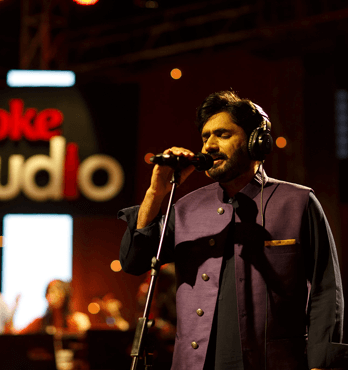Billo

by Ayesha binte Rashid
It’s 1995 and the scene opens to a Punjab jail as a young, clean shaven Abrar Ul Haq is thrown into a cell by two policemen. The scene cuts to a black-and-white shot of Abrar dancing as he sings, “Asaan te jaana an Billo de ghar!”, following up with the iconic, “Kinnhe kinnhe jaana en billo de ghar?” When a chorus affirms their desire to go to Billo’s ghar, he responds with, “Tikkat kataaaaaao, lain banaaaaao!”
Billo’s video shows a hapless Abrar trying to reach his Billo’s home– somehow ending up in jail along the way. Eventually, Abrar reaches his destination– he meets her family, welcomed by her mother and her brother, and finally, finds his Billo. Laden with slapstick, the video complements Abrar’s comedic delivery and the song’s quirky lyrical escapade.
Billo had, as they say, everything: bhangra and rap; lovelorn lyrics that are also fun and cheeky; a chorus made to sing along to. When the song came out, it immediately embedded itself in Pakistan’s pop culture and shot Abrar to instant fame. The lyrics speak of the titular Billo and her famed beauty, and the singer’s wish to go to her home, whether he has to travel on foot or line up and buy a ticket to do so. He curses anyone and everything that gets in his way as he pursues his Billo and declares that he will dress up as a bridegroom, “ jayl shayl la ke, kangghi shanggi waah ke, kaali kaali akkhiyaan ch surmah pa ke ,” and take a wedding procession to her house to ask for her hand in marriage.
Billo came to Abrar in 1993, during an evening run in Lahore, when he crossed a van driver calling out to passengers, “Kinnhe kinnhe jaane e?” Abrar’s lyrical mind responded with, “Asaan te jaana an Billo de ghar, kinnhe kinnhe jaana e Billo de Ghar.” And, with that spontaneous burst of inspiration, Billo was born. By the time Abrar was home, the second verse of the chorus, “tikkat katao, lain banao,” had come to him.
“I was just amusing myself in shughal. Bus, I was in a really good mood. When it was made, I used to laugh because I couldn’t believe that it actually got made. Even when I would sing it, I would laugh,” says Abrar laughing.
The rest of the song did not come to Abrar overnight. In fact, it took two years to be made. The first person to ever hear about Billo was Abrar’s elder brother to whom he had pitched the song disguised as an Indian song he had claimed to have heard. Only when his brother laughed and gave his approval did Abrar confess ownership of the song. It was on his brother’s suggestion that Abrar added the bhangra element to Billo . The song evolved in stages until, in 1995, Abrar felt like it was ready to be recorded.
Billo was recorded in Lahore’s Folk Studio by a group of thoroughly amused musicians. “I played the song for them and they started laughing and said they’d never heard a song like it. They asked me, “Who are you? What do you do?” and I told them that I am teacher who pursues music as a hobby. They kept laughing and made several jibes at me. I really enjoyed that recording session.”
Not experienced in music production at the time, Abrar verbally explained the kind of musical arrangement he had in mind – one that would go on to become his signature style. Each musician gave Billo their instrument’s color – the sum of the parts was better than Abrar had ever imagined it to be. By the time the song was recorded, “I wanted to give them all kisses,” Abrar remembers affectionately. A song that had only been an idea in his mind for two years had finally been brought to life.
To say that Billo was an instant hit would not be an overstatement – Abrar shot to fame and became a household name in the Pakistani music industry with the release of his first song. “My life completely changed because of this song,” says Abrar, “I was teaching at Aitchison College and I had other plans, of perhaps doing something in the CSS (Central Superior Service). This song made me famous overnight! So naturally, I had to come into this field.”
Today, Billo remains iconic because of the memories it has created. This season’s house band members all come to the Coke Studio rendition with their own recollections of Billo. For the younger musicians, Billo is tied to their first memories of music. “That song is all of our childhoods,” says percussionist Aziz Kazi, “I used to wait for this song all week because it would play every Sunday on Music Channel Charts. It would play once on the show and I would wait the whole week just to listen to it somehow.“
For Varqa Faraid, this season’s keyboardist, who was only five years old at the time, the lyrics were a mystery when they first came out, “For many years, I didn’t know it was, ‘tikkat kataao’. I used to think he was saying, ‘teeka teeka lao, teeka teeka lao.’”
Percussionist Hassan Mohyeddin remembers that his first experience with Billo wasn’t even on TV, “I used to live in Iqbal Town and we used to play cricket in the neighborhood and someone was singing it. Then, a little while later, a second boy was singing it, then another boy came along singing it. Later, in the evening, I finally saw it on TV. It was playing constantly. Bus, then I also started singing it.”
The older house band members have even performed Billo in concerts with Abrar Ul Haq. Amir Azhar remembers getting a call from Abrar to play for a concert of his when the song first came out. “I asked, ‘Jee, who’s this speaking?’ he replied, ‘Mein bolran, Billo vaala Abrar,’ in his Punjabi.”
“I sat on an airplane for the first time because of this song”, percussionist Babar Khanna remembers. Babar had only recently started playing the tabla when his ustad, Chakku Bhai, told him about a singer he hadn’t heard of before. The singer happened to be Abrar, who needed a tabla player for his song Billo, which he was performing in Karachi for a show during the 1995 World Cup.
“I still remember, I had come to Karachi from Lahore and Abrar’s show was at Sports Complex. I knew how to play this song on the tabla; Sahir Ali Bagga was on drums and Chakku Bhai was on the keyboard. When I heard [Billo] was on this season, I was reminded of those old days.”
As these musicians take their places on the Coke Studio set, these memories come back to them through the decades. Abrar Ul Haq stands on the mainstage – his nineties attire of blue jeans has been replaced with a waistcoat ensemble, and his once clean shaven boyish face now sports a beard and handlebar moustache. When he begins to perform, his showmanship shines through. The comical performance that once made Billo’s video so funny now translates into a suaveness and lachak (limberness) that somehow perfectly complements the lyrics. And as the house band and the Coke Studio team watches on, we are transported once again to 1995, past and present merging for a moment as music becomes the nostalgic gateway to the beginnings of bhangra pop.
